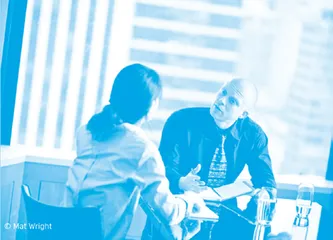Job Interviews
作者: Cath McLellan

A
When recruiters advertise for a post, they probably think that they are searching for ‘the best person for the job’. But the reality is that, despite all the information on an applicant’s CV, the interviewers’ final decision will rely heavily on a face-to-face meeting. In fact, companies don’t necessarily hire the ideal candidate, but rather the person who performed best in the interview.
This and the old saying that ‘first impressions last’ are perhaps two reasons why job interviews are so terrifying for so many people. What you look like, how you shake hands, even the way you sit can all play a crucial role in the outcome before you’ve even answered a question.
Often we focus on our verbal communication, preparing stock answers to typical questions and thinking about the questions we will ask at the end. However, there are studies to suggest that humans form quick, and often accurate, opinions of people based on stereotyping and rapid observations in the first half a minute of meeting them. These quick judgements are a throwback to our evolutionary past, when often we would need to decide very quickly if a new person was a potential threat or not. In a job interview they could mean the difference between success or failure.
B
Often candidates are focused on themselves in the interview, but it is worth remembering that it is an opportunity to show what you can offer a company, not what a company can offer you. Anything you say about yourself in the interview should demonstrate how your skills, personality and qualifications are a good fit for the team.
Therefore it is essential to find out as much as possible about the organisation, its products, its philosophy and exactly what it does. Imagine that you have to give a presentation about the company, and think about possible questions an interested audience might have—you should be able to answer them all from your research. Spend more than just a quick five minutes looking at the company website—try to find news articles about them, read an interview with the CEO, test one of their products. Find out about their competitors and what makes them different or better. Get an idea about how formal or casual the company is, and whether there is an emphasis on teamwork or individual achievement.
C
Making a friendly connection with the interviewer from the moment the interview starts is crucial to ensure a smooth experience. A 2008 study by the University of Iowa confirmed what is often said about shaking hands: that people with a confident handshake were more often seen as extroverted, gregarious and were more likely to be hired than those with a weaker handshake. Making eye contact is equally important.
Neuro-Linguistic Programming (NLP) is an approach to communication that looks at ways to improve how we relate to others and build rapport with them. A common NLP technique, which can work well in job interview situations, is called mirroring. Some studies suggest that when we mirror somebody’s physical movements and language cues, we create an automatic rapport. In this technique, one person adjusts the way they speak and the position of their body so that it is similar to the other person’s. They may also use some of the same words. Although this may feel unnatural or silly at first, with practice this technique, when used subtly, can create a feeling of empathy between the interviewer and the candidate.
Reducing pre-interview nerves is also important in terms of the physical messages we send. Even something as simple as taking a few deep breaths before the interview can calm our nerves and help us to appear more confident as we walk into the room.
D
But obviously, despite all these subconscious signals that we give and receive, there is no substitute for preparation. Anticipating questions and being confident about how we answer them is also essential interview preparation.
It is no surprise then that there are so many websites with lists of typical difficult interview questions and advice on how to answer them. There are certain questions that have become clichés over the years—for example ‘Where do you see yourself in five years’ time?’ It is important to think about how we can be more creative when answering these. Jenna Allcock is a CEO at a graduate recruitment firm and she recommends that this question is best answered by focusing on professional goals that are ambitious but realistic—and that you should avoid talking about money.
E
Of course, there is no magic formula to interview success, but it is worth knowing that job interviews require a unique set of skills that may be totally unrelated to the job in question. Perhaps the key to a good interview is knowing how to be ourselves, while at the same time being the person that we think the company is looking for.
Pre-reading task
You are going to read an article about preparing for job interviews. Before you read, think about the following questions: When did you last have a job interview? What was the interview for and what did you do to prepare for it? Do you think it is better to ‘be yourself’ in an interview, or to adapt your behaviour according to the job or the organisation?